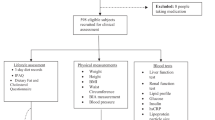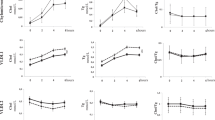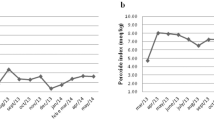Abstract
Objectives: We examined the effects of a high fat diet rich in monounsaturated fat (MUFA-diet) and a moderate fat diet rich in polyunsaturated fat (PUFA-diet) on the susceptibility of LDL to oxidation.
Subjects: 29 subjects with impaired glucose tolerance.
Methods: After consuming a run-in diet [37% of energy (E%) fat, 18 E% saturated fat] for three weeks, subjects were randomly assigned either to a MUFA-diet (40 E% fat, 19 E% monounsaturated fatty acids) or a PUFA-diet (34 E% fat, 10 E% polyunsaturated fat) for eight weeks. The susceptibility of LDL to oxidation was measured by challenging LDL with hemin and H2O2 and measuring the time for the reaction to reach maximum velocity. Results are expressed as lag time to oxidation in minutes.
Results: In the PUFA-diet group (n=15) lag time tended to decrease during the experimental diet (97±28 vs 90±25 min, mean±s.d., P=0.073), whereas in the MUFA-diet group (n=14) there was no significant change (lag time 96±24 vs 100±16 min, P=0.408). The mean change in lag time was −7±14 min (−7.2%) in the PUFA-diet group and +4±16 min (+4.0%) in the MUFA-diet group (P=0.029, PUFA-diet group vs MUFA-diet group). The α-tocopherol concentration in LDL increased significantly (P<0.01) in both diet groups relative to the run-in diet period, but LDL particle score did not change in either of the diet groups during the dietary intervention.
Conclusions: In subjects with impaired glucose tolerance a PUFA-rich diet with a moderate amount of fat tended to increase the susceptibility of LDL to oxidation as compared to a higher fat diet rich in MUFA. Furthermore, the negative mean change in lag time to oxidation found in the PUFA-diet group differed significantly from the slightly positive mean change found in the MUFA-diet group.
Sponsorship: Supported by the Foundation for Nutrition Research, Helsinki, Finland; the Council for Health Sciences, Academy of Finland, and the Ministry of Education, Finland, and the Van den Bergh Foods and Valio Ltd, Finland, for supplying the fat products for the study
This is a preview of subscription content, access via your institution
Access options
Subscribe to this journal
Receive 12 print issues and online access
$259.00 per year
only $21.58 per issue
Buy this article
- Purchase on Springer Link
- Instant access to full article PDF
Prices may be subject to local taxes which are calculated during checkout
Similar content being viewed by others
Author information
Authors and Affiliations
Rights and permissions
About this article
Cite this article
Schwab, U., Sarkkinen, E., Lichtenstein, A. et al. The effect of quality and amount of dietary fat on the susceptibility of low density lipoprotein to oxidation in subjects with impaired glucose tolerance. Eur J Clin Nutr 52, 452–458 (1998). https://doi.org/10.1038/sj.ejcn.1600587
Received:
Revised:
Accepted:
Published:
Issue Date:
DOI: https://doi.org/10.1038/sj.ejcn.1600587



